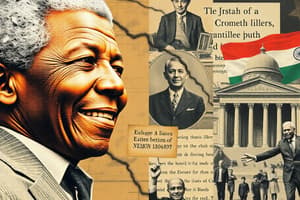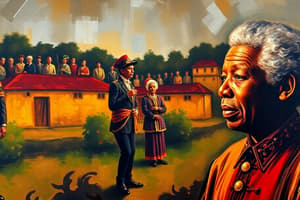Podcast
Questions and Answers
What is the meaning of the name 'Rolihlahla'?
What is the meaning of the name 'Rolihlahla'?
- Defender of the land
- The brave one
- Pulling the branch of a tree
- Stirring up trouble (correct)
What was the primary diet of Mandela's community?
What was the primary diet of Mandela's community?
- Bread and pastries
- Fish and vegetables
- Maize and fermented milk (correct)
- Rice and chicken
Which racial group was the majority in the enforced apartheid system?
Which racial group was the majority in the enforced apartheid system?
- Black (Bantu)
- White (correct)
- Indian
- Colored (mixed race)
What color did the community's dyed blankets represent?
What color did the community's dyed blankets represent?
How did Mandela spend his childhood according to the content?
How did Mandela spend his childhood according to the content?
What was the typical structure of the houses in Mandela's community?
What was the typical structure of the houses in Mandela's community?
Who became responsible for Mandela after his father died?
Who became responsible for Mandela after his father died?
What type of faith was practiced by Mandela's community?
What type of faith was practiced by Mandela's community?
What is the primary focus of the teachings in the Analects according to Confucius?
What is the primary focus of the teachings in the Analects according to Confucius?
What does the concept of 'Jen' represent in Confucian teachings?
What does the concept of 'Jen' represent in Confucian teachings?
Which of the following stories features a character who slays an oni?
Which of the following stories features a character who slays an oni?
In the teachings of Confucius, what is emphasized as essential for personal growth?
In the teachings of Confucius, what is emphasized as essential for personal growth?
What literary form does 'Mukashibanashi' represent in Japanese folklore?
What literary form does 'Mukashibanashi' represent in Japanese folklore?
Which of the following Analects advises against selfishness?
Which of the following Analects advises against selfishness?
In Japanese literature, what type of story is 'Ongaeshibanashi'?
In Japanese literature, what type of story is 'Ongaeshibanashi'?
Which of these characters is known for visiting the bottom of the sea?
Which of these characters is known for visiting the bottom of the sea?
Flashcards
Apartheid
Apartheid
A system of racial segregation and discrimination enforced in South Africa from 1948 to 1994. It was based on the belief that white people are superior to other races and aimed to maintain a white-dominated society.
Tribal Homelands
Tribal Homelands
Designated areas in South Africa where black people were forced to live under apartheid. These areas were often smaller, less developed, and lacked resources compared to areas reserved for white people.
Rolihlahla
Rolihlahla
Nelson Mandela's original Xhosa name, meaning 'stirring up trouble'. This name reflects his rebellious spirit and his willingness to fight for justice.
Traditional Qaba Faith
Traditional Qaba Faith
Signup and view all the flashcards
Beehive Shaped Huts
Beehive Shaped Huts
Signup and view all the flashcards
Red Ochre
Red Ochre
Signup and view all the flashcards
Maize, Sorghum, Beans, Pumpkins, Amasi
Maize, Sorghum, Beans, Pumpkins, Amasi
Signup and view all the flashcards
Herd Boy
Herd Boy
Signup and view all the flashcards
Confucius
Confucius
Signup and view all the flashcards
Analects
Analects
Signup and view all the flashcards
Jen (Benevolence)
Jen (Benevolence)
Signup and view all the flashcards
Yi (Propriety)
Yi (Propriety)
Signup and view all the flashcards
Li (Ritual)
Li (Ritual)
Signup and view all the flashcards
Mukashibanashi
Mukashibanashi
Signup and view all the flashcards
Namidabanashi
Namidabanashi
Signup and view all the flashcards
Ongaeshibanashi
Ongaeshibanashi
Signup and view all the flashcards
Study Notes
Cohesive Devices
- Cohesive devices are linking words, connectors, connectives, or transitional words
- Examples include: and, because, for example, therefore, in addition, and finally
Apartheid
- Enforced by the National Party (NP)
- Four racial groups: White, Indian, Colored (mixed race), Black (bantu)
- 84% of South Africa was for whites (15% of the total population)
- 14% of the land (tribal homelands) was for Black people
Stirring Up Trouble
- Father: Chief Henry Gadla Mandela
- Mother: Nonqaphi
- Born: July 18, 1918
- European name/Xhosa name: Rolihlahla
- Also called Nelson
- Tales of good old days before the arrival of white men and courageous acts of ancestors
- Rolihlahla means "stirring up trouble"
- His people were called Savages and Cattle thieves
A Thembu Prince
- By Martin Meredith
Their Diet
- Maize
- Sorghum
- Beans
- Pumpkins
- Amasi (fermented milk)
Cow's Best Friend
- By Benjamin Porgrund
- Rondavels: roofs
- Mother had three huts (one for cooking, sleeping, and storing grains and other food)
- Was ten when his father died
- His father's nephew, Chief Jongintaba, took over responsibility
- Jongintaba was the head of the Madiba clan
- 1928: Nelson moved to the Great Place
- His cousin is Justice
- Nelson learned English, science, geography, and history
Autobiography (Nelson Mandela)
- His mother planted and harvested mealies
- A portion was made into bread, the rest was dried and stored
- Mother's apron strings were considered "sissy"
Confucius
- Lived 551-479 BCE
- Popularly known as Kong Zî (Master Kong)
- Latin name is K’ung Fu-tzu (The Great Teacher K'ung)
- Analects: collection of teachings
- Analects contains 20 books
- Teaches Jen (benevolence), Yi (propriety), and Li (ritual)
Japanese Literature
- Influenced by Shintoism and Buddhism
- Japanese folklore forms:
- Mukashibanashi (tales of long ago)
- Namidabanashi (sad stories)
- Ongaeshibanashi (stories of repaying kindness)
- Tonchibanashi (witty stories)
- Waraishibanashi (funny stories)
- Yokubaribanashi (stories of greed)
- Stories include:
- Kintaro (superhuman golden boy)
- Momotaro (Oni slaying peach boy)
- Urashima Taro (rescued turtle and visited bottom of the sea)
- Tale of the bamboo cutter (mysterious girl Kaguya Hime)
Studying That Suits You
Use AI to generate personalized quizzes and flashcards to suit your learning preferences.




